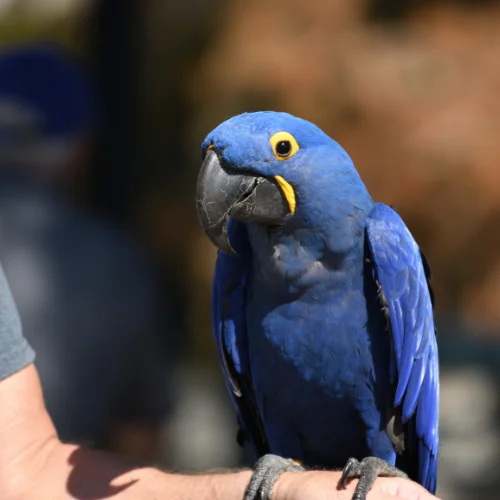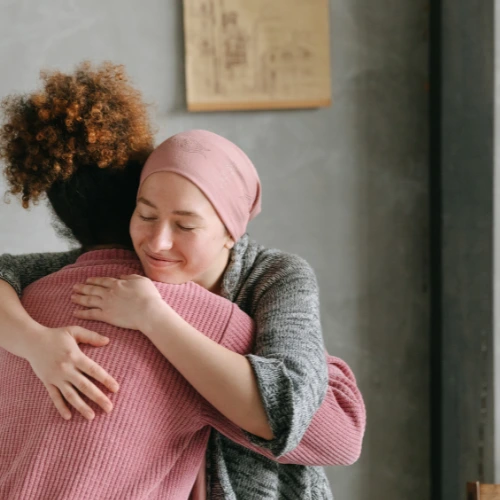Do Parrots Make Good Pets for Seniors?
As you get older, companionship becomes increasingly important for your overall well-being. Pets have long been recognized for their ability to provide comfort, companionship, and joy. Among the various options available, parrots are often considered potential pets for seniors due to their unique traits and characteristics. In this blog post, we will explore the question: Do parrots make good pets for seniors? We will delve into the benefits of owning a parrot, the considerations seniors should keep in mind, and the potential challenges they may face.
Benefits of Owning a Parrot
1. Alleviating Loneliness

Seniors often face feelings of isolation and loneliness, especially if they live alone or have limited social interactions. Owning a parrot can provide companionship and alleviate these negative emotions. Parrots are highly social animals and can form strong bonds with their owners, offering constant presence and emotional support.
2. Reducing Stress and Anxiety

Interacting with a parrot can have a soothing effect on seniors, as the rhythmic sounds of their chirping and the gentle presence of a feathered friend can help reduce stress and anxiety. The tactile engagement with a parrot, such as stroking its feathers or simply watching its colorful antics, can promote a sense of calmness and relaxation.
3. Enhancing Memory and Learning

Engaging with a parrot requires mental stimulation and cognitive flexibility. Seniors can teach their parrots tricks, words, or songs, stimulating memory and learning abilities. The process of training a parrot can be both challenging and rewarding, keeping seniors mentally sharp and engaged.
4. Encouraging Problem-Solving Skills

Parrots are intelligent creatures that enjoy puzzle-solving activities. Seniors can provide their parrots with toys and puzzles that require problem-solving skills, fostering mental agility in both the bird and the owner. These interactive challenges promote cognitive development and can be an exciting and fulfilling experience for seniors.
5. Promoting Physical Activity

Caring for a parrot involves various physical activities, such as cleaning the bird’s cage, providing fresh food and water, and offering opportunities for exercise. Seniors benefit from these activities by staying active and maintaining a routine that incorporates light exercise.
6. Encouraging Social Interactions

Owning a parrot can facilitate social interactions for seniors. Taking the parrot for a walk or bringing it to social gatherings can spark conversations and create connections with other people who share a love for birds. Parrots serve as conversation starters and can help seniors build new relationships.
7. Providing a Sense of Purpose
Taking care of a parrot gives seniors a sense of purpose and responsibility. They become responsible for the bird’s well-being, nurturing it, and ensuring its happiness. This feeling of purpose can significantly improve emotional well-being and mental health, providing seniors with a sense of fulfillment and accomplishment.
8. Offering Unconditional Love and Companionship

Parrots form deep bonds with their owners and can provide unconditional love and companionship. Seniors often find solace in the non-judgmental presence of their feathered companions, creating a meaningful relationship that brings joy and happiness into their lives.
9. Boosting Mood and Happiness

The vibrant colors, playful nature, and entertaining abilities of parrots have a positive impact on seniors’ moods. The cheerful presence of a parrot can lift spirits, reduce feelings of sadness or depression, and enhance overall happiness. Parrots’ ability to mimic human speech and engage in amusing behaviors brings laughter and joy into seniors’ lives.
10. Decreasing Blood Pressure and Heart Rate
Research has shown that interacting with pets, including parrots, can help lower blood pressure and heart rate. The calming effect of a parrot’s presence and the soothing activities associated with caring for it can contribute to improved cardiovascular health for seniors.
Considerations for Seniors
Lifespan and Long-term Commitment
Before deciding to bring a parrot into their lives, seniors need to consider the lifespan and long-term commitment involved. Parrots are long-lived creatures, with some species living for several decades. Seniors should be prepared for the possibility that their parrot may outlive them. It’s crucial to have a plan in place for the care of the parrot in case of unforeseen circumstances. This could involve designating a trusted caregiver or considering adoption options that offer lifetime care for the bird.
Physical Demands and Energy Level
Parrots are active and energetic creatures that require mental and physical stimulation. Seniors should assess their physical capabilities and energy levels to ensure they can provide adequate care for their feathered companion. Parrots need spacious cages, regular exercise outside the cage, and mentally stimulating activities. Seniors must be prepared to devote time and energy to meet these needs or have assistance available if necessary.
Potential Challenges
Noise Level
Parrots are known for their vocalizations, which can be quite loud and disruptive. Seniors who have hearing impairments or live close to neighbors should carefully consider the potential noise level associated with owning a parrot. Certain parrot species, such as macaws or cockatoos, can produce exceptionally loud calls. Seniors should choose a species that aligns with their tolerance for noise or consider alternative pets with less vocalization.
Allergies and Health Concerns
While parrots are generally considered hypoallergenic, some individuals may still be allergic to bird dander or feathers. Seniors with pre-existing respiratory conditions or allergies should consult with a healthcare professional before bringing a parrot into their home. It’s essential to ensure that owning a parrot will not exacerbate any current health concerns or compromise their well-being.
What does the research say?
Research suggests that parrots can indeed make good pets for seniors, but there are specific considerations to keep in mind. A study published by Miami University examined the impact of pet ownership on the well-being of older adults. The findings revealed that owning a pet, including birds like parrots, can provide emotional support, reduce feelings of loneliness, and promote a sense of purpose among seniors.
Furthermore, research has shown that interacting with animals, including parrots, can have positive physiological effects on seniors. A German study found that seniors who interacted with birds experienced a decrease in blood pressure and heart rate, indicating a reduction in stress levels. This suggests that owning a parrot can contribute to improved cardiovascular health for seniors.
Another aspect worth considering is the potential cognitive benefits associated with parrot ownership. Research has demonstrated that engaging in activities with pets, such as teaching parrots new words or tricks, can have a positive impact on cognitive functioning.
While the research highlights the potential benefits of parrot ownership for seniors, it’s essential to acknowledge the challenges as well. One study published in Gerontology and Geriatric Medicine examined the factors influencing pet ownership decisions among older adults. The findings indicated that concerns about long-term commitment, physical demands, and potential health issues were among the reasons some seniors chose not to own pets, including parrots.
Additionally, research has indicated that the noise level associated with parrot ownership can be a significant concern for seniors. A study found that noise was one of the primary factors influencing the decision to own a pet among older adults. Seniors who are sensitive to noise or live in environments where noise can be a disturbance may need to carefully consider the implications of owning a parrot.
In conclusion, while research suggests that parrots can make good pets for seniors by providing companionship, emotional support, and potential health benefits, individual circumstances and considerations must be taken into account. Seniors must assess their ability to meet the long-term commitment and physical demands of owning a parrot, as well as their tolerance for potential noise and any health concerns.
Frequently asked questions (FAQs)
Yes, parrots can make excellent pets for seniors. They offer companionship, and emotional support, and can enhance the overall well-being of seniors.
Parrots do require attention and care, but the level of commitment depends on the species. Some parrots need more interaction and mental stimulation, while others are content with less. Seniors should consider their lifestyle and choose a parrot species that match their capabilities and preferences.
Yes, parrots are known for their long lifespans. Depending on the species, they can live anywhere from 15 to 80 years or even longer. Seniors should consider this longevity when deciding to bring a parrot into their lives.
Parrots require regular attention, mental stimulation, and a proper diet. Seniors should ensure they have the physical and mental capabilities to meet these needs. Additionally, parrots can be noisy, and their longevity means that arrangements must be made for their care in case the owner can no longer provide it.
Yes, parrots can be trained to interact with seniors with specific needs. They can be trained to perform simple tasks, such as fetching objects or providing gentle interaction. However, it’s important to note that training parrots requires patience, consistency, and a positive reinforcement approach.
While parrots are generally safe to be around, seniors should be cautious of potential health risks. Parrots may carry certain bacteria, such as Chlamydia psittaci, which can cause respiratory infections. Regular veterinary check-ups and good hygiene practices, such as washing hands after handling the bird, can minimize these risks.
Parrots are social animals and require social interaction and mental stimulation. Leaving them alone for extended periods can lead to boredom, loneliness, and behavioral issues. Seniors should ensure they have a support system in place to provide care and companionship for their parrot if they need to be away for an extended period.
Conclusion
Parrots can make good pets for seniors, but several factors need to be considered before making this decision. The companionship, emotional support, and intellectual stimulation provided by parrots can greatly enhance the lives of seniors.
However, seniors must carefully evaluate their long-term commitment, physical capabilities, and tolerance for noise. By taking these considerations into account, seniors can determine whether a parrot is a suitable pet for their lifestyle.
Now it’s your turn to join the conversation. Do you think parrots make good pets for seniors? Have you had any experiences with owning a parrot or know someone who has? Share your thoughts and stories in the comments section below and let’s continue the discussion.

